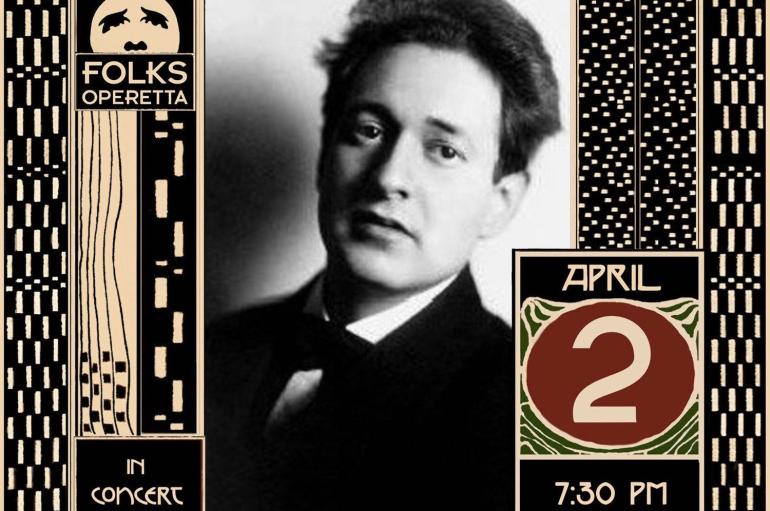
April 2, 2022 | 7:30PM
Logan Center for the Arts Penthouse
Folks Operetta’s “Korngold in Song” concert explores Korngold’s work in art song and operetta. From an early age, Korngold was a prolific composer of lieder. With his keen sense of melody and his affinity for setting poetic text, he was a master of the genre. Korngold also devoted significant time and effort to his orchestrations of operettas by Johann Strauss, Jr. and Leo Fall. He is often cited as re-invigorating operetta after the First World War. This concert will feature the song cycles, So Gott und Papa will; Lieder des Abschieds, op. 14; and Sechs einfache Lieder, op. 9; as well as some of Korngold’s little-known work in the field of operetta, including selections from Die Stumme Serenade, Rosen aus Florida, and Die geschiedene Frau; the rarely-heard Prayer, op. 32; and song selections from some of his film scores.
Featured Soloists
Matthew Caroll, baritone and Katherine Petersen, soprano
Anatoliy Torchinskiy, piano
Other performers include Alison Kelly, soprano; William Roberts, baritone; Gerald Frantzen, tenor; and a small chamber ensemble conducted by Anthony Barrese.
Background
Korngold’s mastery of the genre of art song manifested itself early in the composer’s life. In 1911, at the age of 14, he wrote a cycle of 12 songs, So Gott und Papa will (What God and Papa want), based on poems by Joseph Von Eichendorff. They were presented to his father as a birthday gift. The Sechs einfache Lieder, op. 9 (Six Simple Songs) were the first songs he had published in 1916, and the haunting Lieder des Abschieds, op.14 (Songs of Farewell) which he wrote after the First World War. Lieder des Abschieds was written while he was working on his opera, Die Tote Stadt, considered by many to be his operatic masterpiece. Korngold’s ability as both composer and orchestrator made him a star of the operetta world, where he revised works by Strauss, Offenbach, and Leo Fall. This included completing the posthumous score for Rosen aus Florida based upon the written manuscripts that Fall had left upon his death in 1922. He continued to compose vocal music, including songs for films, with some of the most notable song being written for his fill The Constant Nymph. His work outside the film industry during the early 1940s includes the rarely-performed choral piece, Prayer, op.32 written for a Los Angeles synagogue during the early 1940s.
Program Selections
Song Cycles
- So Gott und Papa will – Matthew Carroll, baritone. Anatoliy Torchinskiy, piano.
- Lieder des Abschieds, Op. 14 (Songs of farewell) – Katherine Petersen, soprano. Anatoliy Torchinskiy, piano.
- Sechs Einfache Lieder, Op. 9 (Six simple songs) – Matthew Carroll, baritone. Anatoliy Torchinskiy, piano.
Choral Selection
- Prayer, Op. 32 – Tenor Gerald Frantzen and chamber group conducted by Anthony Barrese.
Selections from Operettas
- Leo Fall, Die Geschiedene Frau
- Leo Fall, Rosen aus Florida
- Erich Wolfgang Korngold, Die Stumme Serenade
- Singers Gerald Frantzen, Alison Kelly, Katherine Petersen, and Matthew Carroll.
Selections from Films
- Tomorrow, from The Constant Nymph. American Premiere. Alison Kelly and chamber trio.
HEALTH AND SAFETY
All event attendees aged 5+ who are attending Korngold Rediscovered festival events must provide proof of vaccination. By exception, visitors who are unable to be vaccinated for medical reasons or due to a sincerely-held religious belief may provide proof of a negative COVID-19 test taken within 72 hours of the event, or proof of a positive test 14-90 days prior to the event with affirmation that you are not experiencing any symptoms.
The University of Chicago, including the Logan Center, is mask optional. We strongly encourage unvaccinated individuals and those preferring to wear masks to do so.
For full details on vaccination and masking policies, visit the Logan Center For the Arts COVID-19 guidelines page.
